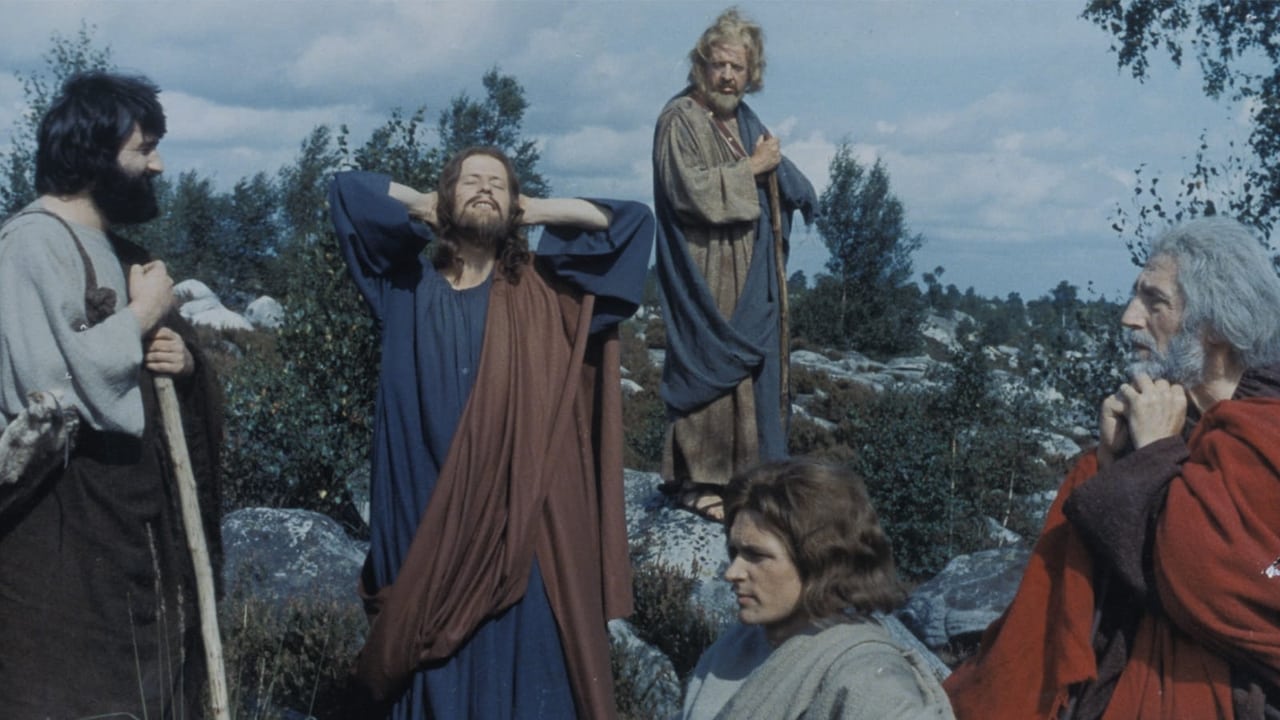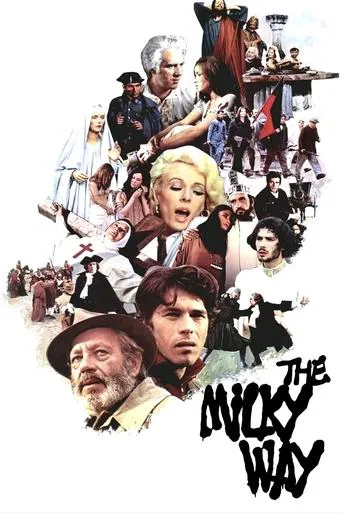

This is my favorite of all the films I've seen by Louis Bunuel. One of his least compromising films, it somehow manages to be simultaneously one of his most entertaining. An ambitious cine-essay on the history of heresy within Catholicism, it's intellectual ambition in no way get in the way of its ability to affect the viewer as a work of cinema. Indeed, it might be the most cinematic film in Bunuel's oeuvre. The cinematography by Christian Matras (of Grand Illusion fame) is uncharacteristically beautiful for a Bunuel film, and although this is allegory at it's most ambitious, it is also a film about life on the road. This was a late career movie for Bunuel, and he was already in his late 60s when he made it. But few of his films seem to me to be possessed by such youthful rigor. Perhaps Bunuel, working in France at the time, was inspired by the rebellious whiper-snapper directors of the then still new French New Wave, particularly Godard, whose Weekend this film sometimes resembles. The final, particularly blasphemous scenes present Christ not as a unifier but a figure whose words, and they are taken directly from the Gospels, are meant to create a vicious anarchy of interpretation.
... View MoreOkay, I know I got your attention with my summary. I said what I did both to provoke you (which is exactly what Luis Buñuel deliberately did in most of his movies) and to make a point. The point is that if you asked most folks to join you in a meal consisting of brains, they would say 'no way!' and think you were crazy (unless the person you ask is Andrew Zimern). This is EXACTLY like asking the average person to watch a Buñuel film. It's so strange and artsy that only a tiny percentage of viewers would have any desire to see it in the first place or stick with it once it begins. As for me, I have love some of his films but have found others just too unpleasant to watch--and I'd put "The Milky Way" in this category.Basically, this is an Absurdist film (a type movie is generally hate)--and it's really not supposed to make any sense much of the time. So, when you see the priest tossing coffee in the policeman's face, there really isn't any reason for this other than the writer/director wanted to do this. Thinking about WHY in an Absurdist film will just make your brain explode--or at least give you a headache! On top of that, scattered very liberally throughout the film are lots and lots of allusions to Christianity--LOTS. I'm pretty sure many at the time this film debuted felt it was rather sacrilegious but to me it just seemed pretty dopey after a while--like there wasn't any payoff other than giving Buñuel a chance to air his gripes about Christianity (a very common theme in his films). Unpleasant and pretty dopey. I know many will think I am just an ignorant fool for not giving this film a great review, but I just didn't enjoy myself and that is why I watch films.
... View MoreI might be tempted to call the Milky Way a masterpiece, but for all of the excellent scenes that dance along on the edge of being silly, strange, dead-serious, and scathing in attack, Luis Bunuel doesn't make it quite an easy first viewing. It is, alongside Phantom of Liberty, though maybe more-so considering its picaresque flow, a difficult film to follow at times, as the folds go in and out of the two pilgrims on their way to Compostela as if in an ocean current. We see Jesus and his disciples. We see some 15th (or 4th) century sermons and heretic slayings and practices, sometimes seeming as mystical as something out of the Dark Crystal. And there's even a duel between two sides of the Catholic coin debating between specifics in the nature of god while fencing furiously. It's what could be defined, if one were looking for an easy label, true surrealism, pointed right at the edge of contradictions, of the daring of the random and of chances taken at the expense of all authority be damned, and at the same time it's a drama of fanaticism and faith in general. What is it to believe and actually buy into these guys, who at their most genial are storytellers and at their worst will burn you at the stake for not going for God in threes versus God as one? Bunuel, at the least for his admirers, makes an attempt with his collaborator Jean-Claude Carriere, to raise questions in the midst of raucous entertainment. Although Bunuel can be even greater when being devilish and playful (eg Discreet Charm), the Milky Way displays the filmmaker reveling in the history and nature of heresy in a construct that's maybe more daring. One truly can't expect what will come next, as one may see a scene with a priest flip-flopping about whether or not the Holy Ghost is in the communion wafer or not (and soon thereafter taken back to the asylum), and then a scene with a rag-tag group of evangelicals in the woods who may or may not be paying heed to God, or to the Devil, or both, or a chef being questioned about how Jesus walked and then a cut-away to how Jesus really walked. As the two pilgrims go along their way, having their own delirious encounters- missing by a bit being struck by lightning, debating Christian free will, one hoping for a car to crash, which does, and then seeing some angel of death or other in the back-seat, and in their continuous streak of being turned away/kicked out by those who would take them in if not for essential hypocrisies- a pattern does start to form (if one could call it that), or at least the essential pieces to Bunuel's puzzle.A lot of times one laughs at the subtlety and the outrageousness: should Jesus shave, do nuns crucify one another, how much can a priest pontificate about not having sex under any circumstances. But it's actually after the film ends that even more ideas start to come around. And yet Bunuel is so cunning, so deadpan with how he directs the actors- some part of his repertory, some not- that it skims into becoming straight drama, which in that case would make it almost dull; the film actually faced some (un-fair) criticism when first released that Bunuel had suddenly made a film cherishing the things he used to damn. How curious, deranged, and honest even in this part of the appeal, the playing of both sides. While it is fairly well known that Bunuel became an atheist following a strict Catholic upbringing (one quote of his, also the name of a documentary on the Criterion DVD, is "I'm an atheist, thank God"), it's never clear whether Bunuel will take one side or the other. There's things that are f***ed up about those who go without any question at all, like the little girls reciting verbatim on the stage, but also of what the man envisions of revolutionaries shooting the Pope in a firing line.Even for those who may consider themselves atheists, as Bunuel might have up to a point (like Scorsese, no matter how much can be sort of dropped, there still remains chunks that stay as part of the auteur), and for those who are rigid believers, The Milky Way attempts to open up a discussion of dogma, heresies- many long forgotten before the writers dug them up in research- and why one should even believe if there is no definitive proof. For all of Bunuel's skewering of schizophrenic or quietly sex obsessed priests and moments of pure mystery like the man who first comes to the pilgrims, there is bits of reverence too, like for the Virgin Mary- who at times becomes part of the debate- and it's challenging and refreshing to see nothing left solidly as 'this is this for sure'. If it may feel a little loose an imperfect on a first viewing it shouldn't detract from everything that can be taken away as pure food for Bunuelian thought.
... View MoreLe fantôme de la liberté (Buñuel, 1974) seems to take off right from this film as if it were a sequel, visually and conceptually. This film however is much more determined to denounce the contradictions and hypocrisy of different religions, while Fantôme has even more artistic freedom. Also this is much more coherent and if there is any danger of getting heavy-handed, Buñuel knows how to joke himself a way out using illusionism or a mild shock-treatment. It is simultaneously very rational and miraculous. The anti-clericism and subversive desires frequently come to the surreal surface. I can't help but see this as an inspiration for Monty Python's 'Life of Brian' (1979), because that film also remotely feels like an off the wall road movie in which anything can happen.The subject matter was sort of tough for an atheist (heretic?) like me, but the humour with which Buñuel lets the characters throw the crucial differences between religions at each other is hilarious. E.g. in the middle of a duel between a Catholic and a Jesuit: 'Prior will is mere impulse. My thoughts and my will are not in my own power ... ma liberte est un fantôme.' 'What does freedom mean anyway? How can I be free if what I do is determined in advance?' etc. And why would all the personnel of a restaurant be caught up in an eloquent discussion about the existence of God while they are at work? See for yourself. Cinematographer Christian Matras (also Le Grande Illusion, 1937) continues to improve Buñuel's visual style using zoom-pan-zoom shots for instance, but keeps it sober.9/10
... View More